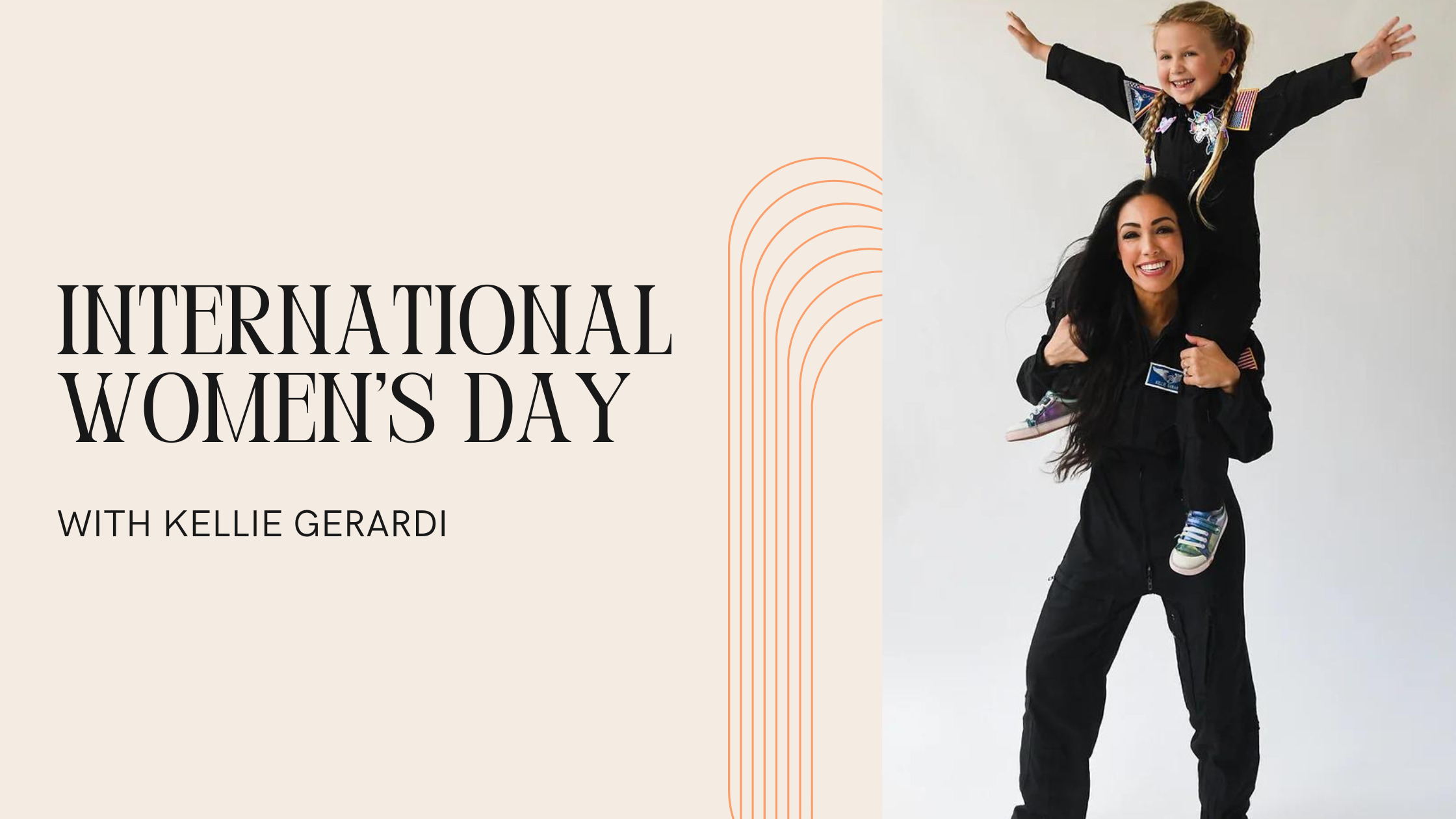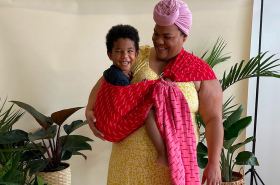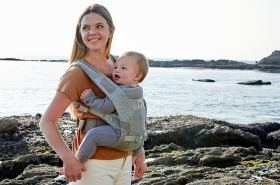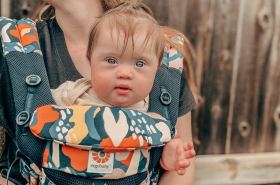
“If we want scientists and engineers in the future, we should be cultivating the girls as much as the boys.” – Sally Ride
Kellie Gerardi is an astronaut, researcher and popular science communicator. On November 2nd of 2023, Kellie flew to space as a payload specialist on the Galactic 05 research mission with Virgin Galactic, during which she conducted healthcare and thermodynamic fluid experiments on behalf of the International Institute for Astronautical Sciences (IIAS).
Kellie is a passionate science communicator with a loyal following of more than one million supporters across her social platforms (@kelliegerardi). She is the author of the acclaimed children’s book series LUNA MUNA, which was read aloud from the International Space Station in 2023. She lives in Jupiter, Florida with her husband and their daughter Delta V.
In celebration of International Women’s Day (IWD), we got to chat with Kellie about how she got to where she is and what IWD means to her.
Take us back to the beginning! When did you know you wanted to be an astronaut?
I grew up in Jupiter, Florida (very on brand for someone with my passions) and always had great exposure to human spaceflight; Space Shuttle flights were part of my childhood and adolescence, and it was incredibly inspiring to have front row seats to the final frontier. I’ve always been very mission-driven and grew up wanting to change the world. As I got older, I sought out people and organizations who didn’t roll their eyes at that. I was passionate about expanding humanity’s footprint in the solar system and created a career in the commercial space industry to help democratize access to space and expand Earth’s economic sphere.
How did your path to space as a payload specialist come about?
My goal has always been to help open up access to space for a new generation of scientists and civilians. And my eventual career path led me to work on every angle of that pursuit — on space policy, regulatory reform, reusable rocket technology, defense and national security, and ultimately microgravity research with the International Institute for Astronautical Sciences (IIAS). We’ve spent years conducting parabolic flight research campaigns here on Earth, including with the National Research Council of Canada and the Canadian Space Agency, but our goal has always been to send our researchers to space, where our experiments can benefit from longer-duration microgravity exposure. IIAS made history when they announced me as the world’s first industry-sponsored researcher contracted to fly on a commercial spacecraft, where I was tasked with operating our healthcare and fluid experiments in the unique environment of space. And that’s exactly what I was able to do this past November when I flew to space as a Payload Specialist on the Galactic 05 research mission with Virgin Galactic, who transformed their spaceship cabin into a science lab for our mission.
Can you share what it was like when you made your first trip to space?
I felt incredibly well-trained for the science portions of my spaceflight and knew exactly what to expect, but in hindsight, I realized nothing could have truly prepared me for the profundity of seeing planet Earth with my own eyes. I was in absolute awe. We’ve all seen pictures of the Earth from space, and many from much further away than I was, but the difference for me was truly experiencing it as a planet among other planets. I’ll never forget it. Carl Sagan’s reflections were front of mind for me when I was able to look back at our home planet: it hit me that I was looking at everything I’ve ever known or loved, every human who has ever lived. If I’m honest, I’m still processing it. I don’t know that I’ll ever quite find the words to do it justice. It was an intensely emotional experience and that emotional saturation still continues months after. I truly believe so many of our problems could be solved if more leaders could have this perspective. I hope that’s in our future.
You’ve said that it was thanks to your parents supporting you that you got to where you are. Can you tell us more about that? And why is it so important for parents to support their kids in their dreams?
My parents have always been my biggest champions. Both overcame incredible adversity in their own childhoods, and they poured their hopes and dreams into me, nurturing my passions and curiosities and building up my self-confidence from a young age. They spent my childhood convincing me I was capable of reaching for any of my dreams, and in turn I spent my adulthood trying to prove them right. We joke that I took their encouragements of “reach for the stars!” way too literally. As a mother myself now, I’m doing my best to pass that limitless mindset along to my daughter Delta as well.
As of March 2023, fewer than 100 women in history have flown in space. How do you feel when you read that statistic? How can we change that?
Being one of the first one hundred women in history to fly to space, and one of only a handful of mothers, is incredibly humbling. It’s the honor of a lifetime to be one of them, but now the real work begins: helping to blow open the door for commercial human spaceflight — because the limiter has always been access and not aptitude. It’s incredible that I was ultimately able to walk through that door as an astronaut myself, but my ultimate goal is to hold it open for everyone who will follow. That’s the real reward. I believe space is humanity’s shared past and shared future and I’ve always been motivated to help democratize access to space for the next generation— not only for researchers like myself but for civilians of all disciplines. I believe our next giant leap will require the talents of artists, engineers, and everyone in between.
Why is it important for women to participate in the space program?
For me, space has always represented the absolute best of humanity, and the hope that we can survive the present so that the next generations can live in the future. That future isn’t guaranteed, but I’m convinced it’s within our reach. We’re still at the very, very beginning of humanity’s journey in space. We’ve taken our first small steps, and we need all hands on deck for our next giant leaps. I’m excited to see representation increase — by gender, by race, by nationality. To put it into perspective: when we talk about space exploration and space settlement, we’re really discussing the future of the human species. One of my favorite quotes sums it up perfectly, “there are no passengers on SpaceShip Earth. We are all crew.” So my hope is that everyone finds their own way to contribute to that future.
Ok. Tampons in space. You made a video talking about this and you have to tell us more. HOW do you plan for that?!
Getting my period right before I flew to space was the big “serves you right” moment of my life. A few weeks before my spaceflight I had made a silly viral video joking about how NASA had once asked Sally Ride if 100 tampons would be the right number for her seven-day spaceflight. The joke was on me, though, as my own cycle ending up coming more than a week early, and suddenly becoming an unexpected issue I had to plan around for flight day. Because my cycles are usually regular, I wasn’t planning on having it for my flight, and otherwise would have used birth control to postpone it until after my spaceflight. The impact wasn’t huge, just unlucky and annoying. But no, dealing with my period wasn’t on my girlhood vision board of flying to space!
I’ve seen one of your posts responding to criticism that you shouldn’t have had kids if you wanted a career. What’s your response to this criticism and how would you encourage other working moms like you?
The mindset that your identity and dreams become permanently capped off with pregnancy is unfathomable to me, and it’s not the future I want for my daughter. Becoming Delta’s mom made my dreams burn brighter and my sense of purpose grow so much deeper, fueled by the hope that we can survive our time so that her generation can live in the future.
Society sells us the dream that little girls can grow up to be anything if they work hard enough… and then when they’re grown, turns around and scolds them for prioritizing a career alongside motherhood. I don’t feel guilty for pursuing my dreams. I only feel grateful for the opportunity to set an example for my daughter to probe the farthest boundaries of her own potential in this one precious life she gets.
My baby watched me leave the planet and fulfill a lifelong personal dream and that’s what I want for her future. To any mission-driven younger women who receive comments that make you second-guess if you can make a career & family work one day, or moms made to feel guilty on the days when those scales don’t balance: tune it all out. If you wouldn’t seek life advice from those people, don’t take life criticism from them.
You’ve also written two books! What was the inspiration behind them?
Yes! My LUNA MUNA children’s book series began as a series of bedtime stories for my own daughter. When I was pregnant and filling our nursery bookshelves, nearly all of the main characters in the space books were boys. And when Delta was a toddler, she liked space, but gravitated more towards books that had sparkle and pink, like Pinkalicious or Fancy Nancy. I wanted to create a series that matched the multitudes of my daughter’s interests and showed children that space and sparkle and glitter and girlhood are all themes that go together perfectly, and the character of future astronaut Luna Muna and her sparkly space helmet was born! The reaction to the series was incredible, and a real testament to the market gap that existed there. I love seeing kids dressed up as Luna Muna for Book Character Days and Halloween, and seeing the ways they identify with the series. Funny enough, Luna Muna’s astronaut dreams came true in real life and she actually beat me to space! The book was read aloud from the International Space Station in the Spring of 2023 as part of the crew’s global STEAM outreach activities, just a few months before my own spaceflight!
What does International Women’s Day mean to you?
Every International Women’s Day, I reflect on the incredible societal progress we’ve made over the past generations, and determination to help push us even further towards an equitable future. I’m filled with gratitude for all the female trailblazers in the world who are reshaping access and opportunity for the next generation. The most rewarding aspect of my own journey has definitely been experiencing it through the eyes of my 6 year old daughter Delta. We’ve had fewer than 100 female astronauts, but in Delta’s mind, flying to space is just another thing moms do! She’s going to grow up knowing that not even the sky is a limit. It’s also been a powerful reminder of how much can change in a single generation. When my mom was born, human beings hadn’t yet been to space. And when she was growing up, women weren’t eligible. Just one generation later, she watched her daughter reach the stars and watched her granddaughter take it for granted. It’s a paradigm shift and I’m filled with excitement for Delta’s generation. I hope I’m around to see the future she inherits, but I feel so lucky to be able to contribute to it in some small way.
You’re very open about your whole life on social media – from work to infertility. Why is it important to you to share so openly and honestly?
Visible and accessible representation matters immensely to me. I had front row seats to the final frontier growing up in South Florida, but it wasn’t obvious to me how I hope to be a part of that. I share my life and journey on social media because it spells out a new path for a new generation, and it puts a name to a face and details to a dream that can sometimes feel far out of reach. It’s so motivating to know that my platform can be a catalyst for people adjusting the limiter on their own aptitude and imaginations. Being a mom is also a huge part of my identity, and visible representation of motherhood in the space industry is very important to me, especially considering only a handful of mothers have ever flown to space. This is part of of the reason I share so many personal aspects of my life on social media — I want to reach any mission-driven younger woman who are second-guessing if they can make a career and family work one day (you can!) and I want to re-assure moms who are made to feel guilty on the days or weeks when those scales don’t quite balance. Along with the life & career highs, I also feel compelled to share the lows, including the last six years of my struggles with recurrent miscarriages and secondary infertility. Women’s health topics can be so taboo, and I’m at a point in my life where I prefer to have my conversation out in the open. Fertility struggles and pregnancy loss can be such isolating experiences despite their prevalence, and I want to help shine a light on struggles that so many women experience. Every day, millions of women are navigating this physical and emotional struggle while still showing up in every single way for their families, their jobs, and their communities. I want them to feel seen and know they’re not alone.
Anything else you’d like to add for all the women out there?
Stay true to yourself and don’t ever dull your shine. As I was preparing for my flight I kept reflecting on how few women we’ve seen in these roles. It was really important to me to not tone down my personality or femininity in an attempt to match a picture of what someone else thought an astronaut or a woman in STEM should look like — I wanted to bring my full self to space and show my daughter that being yourself is always enough. I showed up as my authentic self – doing science in space with a full face of makeup and a wrist full of friendship bracelets, and I wouldn’t have it any other way.
——
We’re so grateful to Kellie for taking the time to chat with us! You can read more about her research experiments here and stay up-to-date with all she’s doing on Instagram @kelliegerardi



